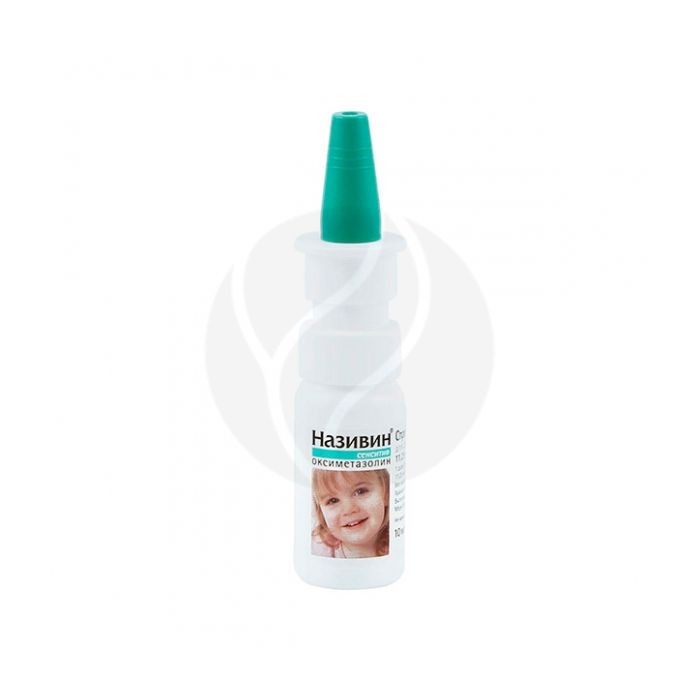Nazivin Sensitiv spray 11.25mkg / dose, 10ml
Expiration Date: 05/2027
Russian Pharmacy name:
Називин Сенситив спрей 11.25мкг/доза, 10мл
Colds or viral infections of the upper respiratory tract, accompanied by a runny nose;
rhinitis of any etiology;
sinusitis;
eustachitis;
otitis media;
to eliminate edema before diagnostic manipulations in the nasal passages.
NazivinЃ Sensitiv nasal spray dosed 11.25 mcg / dose is intended for nasal administration.
Children aged 1 to 6 years: 1 injection of NazivinЃ Sensitive nasal spray dosed 11.25 mcg / dose in each nostril 2-3 times a day.
The drug is used for 5-7 days. The drug can be re-prescribed only after a few days.
If symptoms worsen or do not improve within 3 days, you should consult your doctor. In the recommended dose, without consulting a doctor, use for no more than 7 days.
Doses higher than recommended can only be used under medical supervision.
One 45 ?L injection contains:
- 11.25 mcg of oxymetazoline hydrochloride - for NazivinЃ Sensitive nasal spray dosed at 11.25 mcg / dose;
1 dose contains:
Active substance:
NazivinЃ Sensitive 11.25 mcg / dose:
Oxymetazoline hydrochloride - 11.25 mcg.
Excipients: citric acid monohydrate 27.40 ?g sodium citrate dihydrate 172.03 ?g glycerol (85%) 1121.44 ?g purified water - 44027.86 ?g Equivalent to 45 ?l
Atrophic rhinitis;
angle-closure glaucoma;
hypersensitivity to the components of the drug;
surgical interventions on the dura mater (in history).
For the drug NazivinЃ Sensitiv, nasal spray dosed 11.25 mcg / dose - children under 1 year of age.
Carefully:
With increased intraocular pressure, chronic heart failure, arterial hypertension, angina pectoris; arrhythmias; chronic renal failure; in patients with prostatic hyperplasia with clinical symptoms (urinary retention); severe atherosclerosis; with hyperthyroidism; diabetes mellitus; pheochromocytoma; tachycardia; therapy with monoamine oxidase (MAO) inhibitors and tricyclic antidepressants, as well as other drugs that increase blood pressure; porphyria.
Pharmacodynamics
NazivinЃ Sensitive (oxymetazoline) has a vasoconstrictor effect. When applied topically to the inflamed nasal mucosa, it reduces swelling and nasal discharge. Restores nasal breathing. Elimination of edema of the nasal mucosa helps to restore aeration of the paranasal sinuses, middle ear cavity, which reduces the likelihood of bacterial complications (sinusitis, sinusitis, otitis media).
With local intranasal application in therapeutic concentrations, it does not irritate and does not cause hyperemia of the nasal mucosa.
The drug Nazivin Sensitiv nasal spray dosed at 11.25 mcg / dose begins to act quickly, within a few minutes. The drug NazivinЃ Sensitiv nasal spray dosed at 22.5 mcg / dose acts from 25 seconds.
The duration of action of the drugs NazivinЃ Sensitiv is up to 12 hours.
The results of a double-blind, placebo-controlled study in patients with acute viral rhinitis aged 12-70 years showed that the use of the drug NazivinЃ Sensitiv nasal spray dosed at 22.5 ?g / dose reduces the median duration of the common cold from 6 to 4 days.
Pharmokinetics
With local intranasal administration, oxymetazoline does not have a systemic effect.
The half-life of oxymetazoline with its intranasal administration is 35 hours. 2.1% of oxymetazoline is excreted in the urine and about 1.1% in the feces.
Overdose
Clinical signs of intoxication with imidazole derivatives can be nonspecific and indistinct, since the phases of hyperactivity are replaced by phases of depression of the central nervous system, cardiovascular and respiratory systems. Symptoms: anxiety, restlessness, hallucinations, seizures, a decrease in body temperature, lethargy drowsiness, coma, narrowing or dilated pupils, fever, sweating, pallor, cyanosis, palpitations, bradycardia, arrhythmia, cardiac arrest, increased blood pressure, decreased blood pressure, nausea, vomiting, respiratory depression, respiratory arrest.
In children, an overdose can cause the development of symptoms from the central nervous system, such as agitation, convulsions, coma, bradycardia, respiratory arrest, as well as an increase in blood pressure, followed by a possible decrease in blood pressure.
Treatment: gastric lavage, intake of activated carbon (in case of accidental ingestion of the drug); symptomatic.
In case of severe overdose, intensive therapy is indicated in a hospital setting. The use of vasoconstrictors is contraindicated.
Side effects
Uncommon: burning or dryness of the nasal mucosa, sneezing, nosebleeds, Quincke's edema, itching. In rare cases: after the effect of using the drug NazivinЃ Sensitiv has passed, a feeling of 'stuffiness' in the nose (reactive hyperemia).
Rarely: increased blood pressure, headache, dizziness, palpitations, tachycardia, anxiety, irritability, sleep disturbance (in children), nausea, insomnia, exanthema, visual impairment (if it gets into the eyes). Very rare: fatigue, drowsiness, anxiety, hallucinations, convulsions, respiratory arrest (in infants).
Long-term continuous use of vasoconstrictor drugs can lead to tachyphylaxis, atrophy of the nasal mucosa, and recurrent edema of the nasal mucosa (rhinitis medicamentosa).
Special conditions
Avoid contact with eyes.
In order to avoid the spread of infection, it is necessary to use the drug individually.
Influence on the ability to drive vehicles and other mechanisms:
After prolonged use of remedies for the common cold, containing oxymetazoline, in doses exceeding the recommended ones, a general effect on the cardiovascular system and the central nervous system cannot be ruled out. In these cases, care should be taken when driving vehicles and engaging in other potentially hazardous activities that require increased concentration of attention and speed of psychomotor reactions.
Drug interactions
Slows down the absorption of local anesthetic drugs, lengthens their action.
In patients taking monoamine oxidase inhibitors (MAO) within the previous 2 weeks and within 2 weeks after their cancellation, tricyclic antidepressants or other drugs that increase blood pressure - increase in blood pressure.
The co-administration of other vasoconstrictor drugs increases the risk of developing

